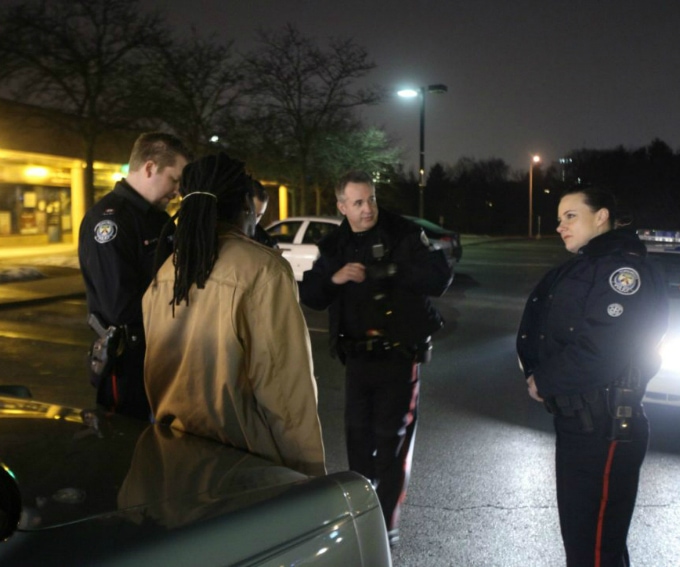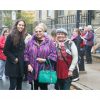KJIPUKTUK (Halifax) – Last night about 25 members of the African Nova Scotian community gathered at the Cornwallis Street Baptist Church hall to once again talk about carding, or police street checks as we call the practice in Nova Scotia.
For privacy reasons no recordings or cameras were allowed at the meeting. I will refrain from identifying people who attended the meeting for that same reason.
The overall consensus: Halifax police behaviour is often racist, the practice of carding itself is racist, and the community is tired of having to tell white people this over and over without anything ever substantially changing for the better.
The meeting was called by the Nova Scotia Human Rights Commission. The Commission is tasked with the analysis of police street checks by the City of Halifax, after a Freedom of Information request early this year revealed that Black people are three times more likely than white people to be subjected to carding. Dr. Wortley, the Ontario sociologist hired to lead the study, was also in attendance.
The meeting was reminiscent of an earlier community meeting at the North End library, with Halifax Regional Police chief Jean-Michel Blais in attendance. The stories were the same, and the anger was the same.
Random stops for no earthly reason, police refusing to explain why a person is being stopped, rude and intimidating cops throwing their weight around, story after story after story.
Routine traffic stops, and people immediately end up out of their car, hands on the roof, with the officer’s hand resting on his gun. The embarrassment when colleagues and community members get to witness that.
We have been singled out for generations, we have told these stories thousands of times, what makes this exercise any different than the ones before, people asked.
And why doesn’t anybody in the force speak out when they witness these things? Why doesn’t the chief step in and confront these cops, make clear that this behaviour isn’t tolerated?
People don’t call the police even in an emergency because they don’t feel safe.
Dr. Wortley explained that the project he leads will go far beyond the simple data analysis that Chief Blais has said this is all about. Blais has frequently suggested that somehow the disproportionate number of stops of African Nova Scotians can be explained away by something other than systemic racism.
Wortley assured the attendees of last night’s meeting that this is not what he believes, and that he got their message loud and clear.
Similarly, Human Rights Commission lawyer Kymberly Franklin, who moderated the meeting, explained why the study was needed. “Whether we go to court, to the Chief, or to the Police Commissioners, we need this expert proof,” she said. “ If we decide to go to litigation we can’t do that without ammunition and evidence.”
However, the issue of carding and police bias and racism is a political issue. It is only because municipal, provincial and even federal politicians refuse to do what we hired them for that this lengthy analysis with uncertain outcomes is even taking place.
There is no way that our politicians don’t know about the kind of police treatment members of the African Nova Scotian community are subjected to on a daily basis. Police chief Blais must know as well.
That they don’t act upon that knowledge without delay, but call for an analysis instead, is shameful, That white Nova Scotians allow this to happen is just awful.
Two more community meetings have been scheduled: Tuesday November 7th at 7 PM, at the Black Cultural Centre, and Thursday November 9th, at 7 PM, at the North Preston Community Centre.
If you can, please support the Nova Scotia Advocate so that it can continue to cover issues such as poverty, racism, exclusion, workers’ rights and the environment in Nova Scotia. A pay wall is not an option, since it would exclude many readers who don’t have any disposable income at all. We rely entirely on one-time donations and a tiny but mighty group of dedicated monthly sustainers.





The title of this article needs to be fixed. It’s incorrect grammatically and I think that takes away from the importance of the topic
Curious what you see as grammatically incorrect.
Exactly
are not is?
Your referring to multiple people in a group and used a singular. I’m pretty sure not every single cop in the HRM is racist. The current grammar used means you’re literally saying every single cop in Halifax is racist.
True. Fixed it.
Hmm, I thought “is” was perfect as it captured the whole of the department. As in, their policies and the practice of carding is racist. Either way works I suppose.
Great post by the way, tons of cops in the HRM are racist as hell. Stuff needs to change.
Such an important issue and 5 of 6 posts are about grammatical errors in the topic. Shows exactly where you are. Now I do hope that something can come out of these consultations and those racist officers can be stopped.
Know what questions to ask. Violating your right of ‘Unreasonable Search or Seizure’ is against the law. It’s not like a Municipal bylaw (like a parking ticket might be). It’s a violation of Federal Law under the Canadian Charter Of Rights and Freedoms. No matter what “Carding” excuse is used – you have a legal right of protection from the Police arbitrarily searching for any information about you – like your name, your address, your DOB, where you’re going, where you’re coming from… Ask: “What crime have I committed?” “What reasonable suspicion can you articulate that I’ve committed a crime?”, “What probable cause gives you the right to demand my identification?”, “Am I being detained?”. If you’re told you’re not being detained – walk away – hopefully while filming. If you’re then arrested, and have acted respectfully, you’ve got a shot at a payday.